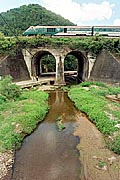 Vintage bullets found at site of slayings Vintage bullets found at site of slayings
Associated Press
WASHINGTON — President Clinton plans to express U.S. regret that South Korean civilians were killed at the hands of American forces during the Korean War, senior administration and defense officials said.
 |
| U.S. troops killed South Korean refugees at this bridge during the opening days of the Korean War.
Associated Press |
Having decided against a formal apology, Clinton intends to issue a written statement today regretting the loss of innocent lives in the 1950-53 conflict, said the officials, who discussed the matter yesterday on condition they not be identified.
Clinton’s statement will be timed with the planned release of the Pentagon’s final report on an Army inspector general investigation of a July 1950 incident in which American soldiers reportedly killed a significant number of South Korean civilian refugees near the hamlet of No Gun Ri. The South Korean government conducted its own investigation and will release its report simultaneously.
It could not be learned with certainty yesterday whether Clinton’s statement would say specifically that he regretted the No Gun Ri incident or whether the statement would be cast in a broader context of civilian casualties throughout the war.
"The president will issue a statement of regret," a senior administration official said without elaborating.
Clinton earlier decided that the United States would not provide financial compensation to the survivors and families of the victims.
Although the investigations of No Gun Ri have raised highly sensitive issues, the Pentagon planned to stress in its presentation today that the two governments are still committed to their long-standing alliance and to honoring the dignity of all who served and died in the war, which began when communist North Korea invaded the South in June 1950, the officials said.
The U.S.-South Korean defense alliance dates to the outbreak of the war. It has been strained in recent years by tensions over relations with a more diplomatically active North Korea, protests over the presence of U.S. troops in South Korea and a lengthy negotiation this year to renew the legal basis on which American forces are permanently stationed there.
Officials said the Pentagon intended to stress today that the U.S. troops who were sent to fight in the early weeks of the war were ill-equipped, poorly trained and led by commanders who were not prepared for the chaotic conditions.
In addition to the Clinton statement and the Army’s investigation report, the Pentagon will publish jointly with the Seoul government today a "statement of mutual understanding" that was expected to enumerate the points of fact about the No Gun Ri incident on which the two governments agree, including that U.S. soldiers shot to death an unconfirmed number of civilians.
In the Pentagon’s first public comment about the result of its investigation, Army Secretary Louis Caldera said on Dec. 14 in reference to the incident at No Gun Ri, "I think there was loss of life there and that was very regrettable." Caldera questioned, however, the reliability of the memories of the South Korean survivors.
The South Korean government pressed Washington to apologize for the killings, but the Clinton administration refused.
Washington has agreed to finance the construction of a monument in South Korea to civilian victims of the war. The United States also offered to establish scholarships for families of the victims, although officials in South Korea indicated that would not be accepted.
In a series of reports on No Gun Ri, The Associated Press quoted former soldiers and Korean survivors as saying a large number of refugees were killed by U.S. troops over a three-day period in late July 1950. Ex-GIs spoke of 100, 200 or simply hundreds killed. The Koreans, who are seeking compensation from the United States, say 300 were shot to death and 100 died in a preceding air attack.
[back to top] |

